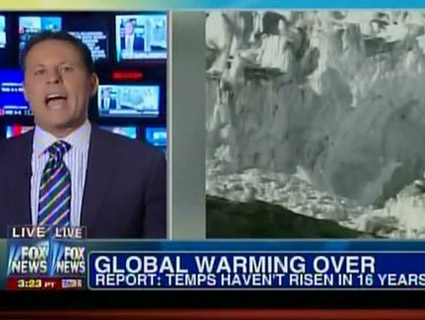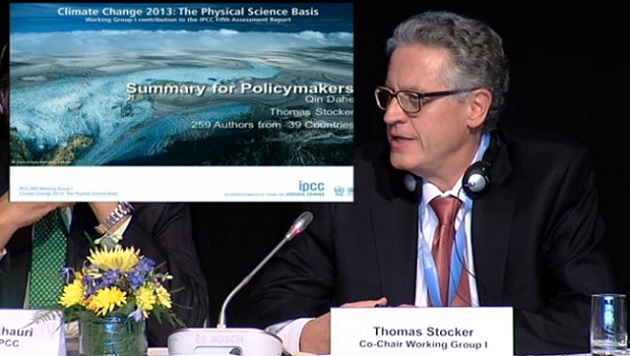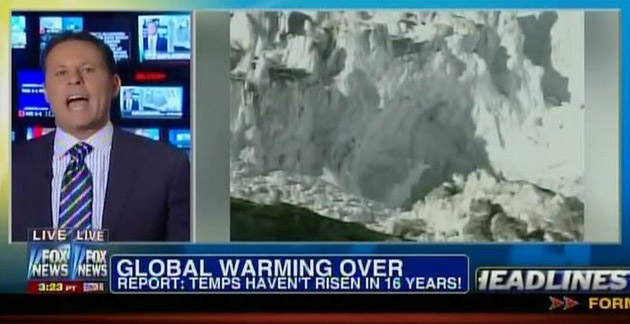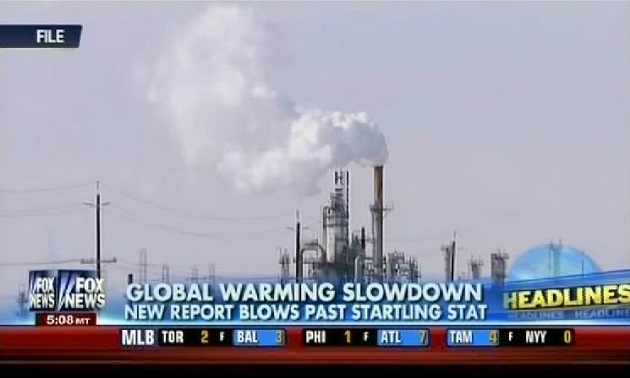
Fox News on the morning of September 27, 2013, covering the new IPPC report on climate changeMedia Matters/Fox News
In a major report released late last month, the United Nations’ Intergovernmental Panel on Climate Change, the world’s leading authority on climate science, told us it was more certain than ever that humans are causing global warming. It also upgraded its projections for sea level rise by the end of the century, and even broached the subject of climate change’s irreversibility: We may already have done so much harm to the Earth that some of it can’t be undone in our lifetimes, or even in the lifetimes of future generations as far out as most of us can imagine.
This, you might think, would be quite a media story. Yet instead, something funny happened on the way from the scientists’ heads to the public’s ears, and many journalists instead embraced a very different narrative—in many ways, almost the opposite narrative. Global warming, they suggested, had “paused” or was slowing down. And scientists didn’t really understand why.
How could this disconnect, this huge divergence of narratives, have happened? What follows is the story of a communications failure that is ultimately harmful to all of us. And it was brought on by combination of causes that, unfortunately, we’ve seen work together before to mar the communication of climate science: Misinformation from climate skeptics, false balance and just plain bad science reporting from much of the media, and to top it all off, poor communication by scientists themselves.
The Rise of the Pause
To begin, let’s turn to the tape. On September 26—just before the IPCC report’s September 27 release—CBS News provided a textbook case of misleading journalism focused on the alleged global warming “pause.” Sadly, in coverage of the new IPCC report, it was far from an exceptional one.
At the outset of the segment, CBS’s Mark Phillips intoned: “Another inconvenient truth has emerged on the way to the apocalypse. The new UN report on climate change is expected to blame man-made greenhouse gases more than ever for global warming. But there’s a problem. The global atmosphere hasn’t been warming lately.”
Then followed an animation, seeming to show that since the year 1998, rising carbon dioxide levels in the atmosphere haven’t been matched by rising temperatures. Soon, CBS cut to a scientist trying to explain this apparent global warming “pause” by saying that the missing heat has gone into the oceans. Then, presumably for balance, came an interview with a climate skeptic who, when asked whether the “pause” blunts the urgency of doing something about global warming, replied that “It has already.” Watch the full segment here:
We all expect Fox News to sow doubt about global warming. But in coverage of the IPCC report, a storyline like CBS’s seemed to show up regularly, and not just at conservative outlets. “What I find really dismaying is how much even the very scientifically informed media has bought into the false story line about a ‘pause’ in overall warming,” says Peter Frumhoff, a climate scientist and the director of science and policy at the Union of Concerned Scientists. There were good stories as well, but there were quite a lot of “pause” stories. Indeed, in the press conference following the report’s release in Stockholm, this “pause” was the topic most asked about by journalists.
This has occurred despite the fact that claiming that global warming has “paused” is deeply misleading. The IPCC explained as much in its just-released report, where it noted that although the rate of warming is somewhat smaller over the last 15 years, selectively seizing on this period, from 1998-2012, basically represents a case of bad statistics.
After all, the year 1998 was a record temperature year, due to a strong El Niño. So by making it the first year of an analysis you’re stacking the deck. “If you shift just 2 years earlier, so use 1996-2010 instead of 1998-2012, the trend is 0.14 C per decade, so slightly greater than the long-term trend,” explains Drew Shindell, a climate scientist at NASA who was heavily involved in producing the IPCC report. This is why climate scientists generally don’t seize on 15 year periods and make a big thing about them. (For a more thorough rebuttal of the “pause” narrative, see here.)
The “pause” is thus as much about media innumeracy as it is about the atmosphere. But nonetheless, to a large extent the narrative seems to have taken hold. While no comprehensive media content analyses appear to have been completed yet, we can point to at least one indicator suggesting the profusion of this narrative. A Google Trends search reveals that the phrase “global warming pause” saw a dramatic uptick in search attention in the past few months and especially in September:
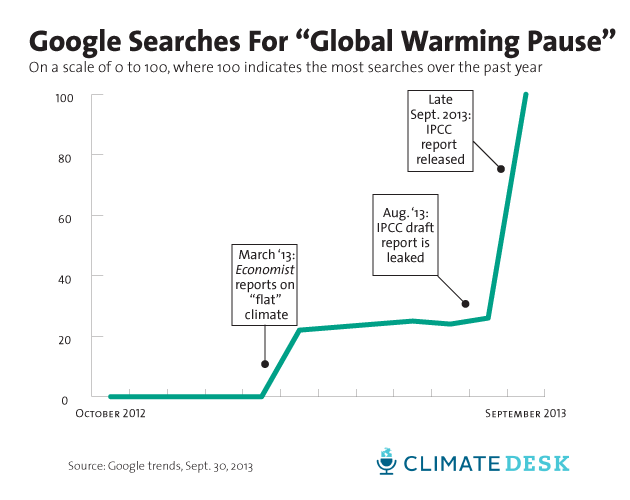
Google trends search for the phrase “global warming pause,” conducted on September 30, 2013. Google Trends/Maggie Severns
Failure to Communicate
It wasn’t supposed to go like this. Not this time around.
In late 2009 and early 2010, climate science suffered a series of public relations black eyes that seemed to constitute a major wake-up call about just how much skeptics, with the help of the media, could undermine climate science. First there was “Climategate,” in which a trove of leaked emails were spun to suggest that climate scientists had been engaged in wrongdoing and the torquing of data. It wasn’t actually true, but boy did much of the press make it look that way. (Subsequent research by communications scholars at Yale and George Mason universities found that Climategate had damaged public belief in global warming and public trust in scientists, albeit principally among political conservatives and libertarians).
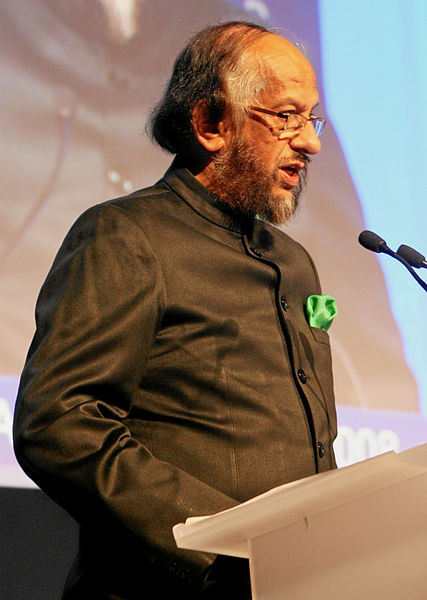
Shortly afterwards came the Himalayan Glaciers scandal, where the IPCC truly was at fault. In essence: One of the IPCC’s vast reports contained a major error about future changes to the glaciers of the Himalayas, incorrectly predicting that they would vanish by the year 2035, a mistake that may have sprung from a simple typo (the original source predicted the year 2350). Mistakes happen, but in this case the cover-up was worse than the crime. When the report was initially questioned, the IPCC was defensive, rather than acknowledging the problem. It only admitted the error months after it had initially been pointed out, thus making the whole thing a much bigger deal than it would otherwise have been.
In the wake of this, there was much hand-wringing, and many calls for the IPCC to improve its communications and have a more realistic outlook on the difficulty of its task in the public arena. “As the IPCC prepares its Fifth Assessment Report, it does so with what, to my eye, appears to be an utterly inadequate budget for communicating its findings and responding in an agile way to nonstop public scrutiny facilitated by the Internet,” observed New York Times science and environment blogger Andrew Revkin in a 2011 essay.
“The immense collective effort to produce periodic climate assessments is typically not well matched with public communication and outreach efforts for these reports, leaving a vacuum to be filled by less authoritative sources,” added a study of the public reception of the IPCC’s reports by Peter Frumhoff and his colleagues.
The IPCC responded by ramping up its communications efforts. It “upgraded” a prior communication staff job to a senior-level position, and added an additional junior staffer. In addition, the IPCC’s budget documents outline an array of communications expenditures related to the Fifth Assessment Report’s release. However, it is noteworthy that most of the budget total is for next year, not this year, even though it’s likely that the peak moment for media attention has already passed. Furthermore, more than half of the 2014 budget is dedicated to scientists’ travel (720,000 Swiss francs, or about $800,000). The total communications budget for 2013 was 240,000 Swiss Francs (about $265,000), and for 2014 is 1,145,000 Swiss Francs ($1,265,000).
Such investments notwithstanding, one plainly avoidable communications blunder occurred in the rollout: The IPCC released the report on a Friday, which is infamous for being the day of the week when you try to bury bad news so it won’t be noticed. More important, it’s not clear that the panel’s communications ramp up prepared it to deal with a new, combined media-skeptic line of attack: the “pause.”
Numbers Game
For years, climate skeptics have been using a kind of statistical sleight of hand—the fact that 1998 was a record temperature year, due to a strong El Niño—to suggest that there had been no global warming ever since. For instance, here’s an example of this argument being made, in the op-ed pages of the Daily Telegraph, as far back as the year 2006. And here’s a contemporaneous rebuttal.
But it wasn’t until March 2013, according to the Google Trends data above, that the “pause” narrative really started to get traction. The apparent reason? A major feature story in The Economist declaring that “over the past 15 years air temperatures at the Earth’s surface have been flat while greenhouse-gas emissions have continued to soar.” Skeptics were delighted, and other media outlets, from Reuters (“Climate scientists struggle to explain warming slowdown“) to the Drudge Report, piled on.
At the time, many critics pointed out that these assertions were scientifically misleading. A glance at the animation below should explain why. However, this wasn’t enough to derail the building “global warming has slowed down, and scientists don’t know why” narrative.
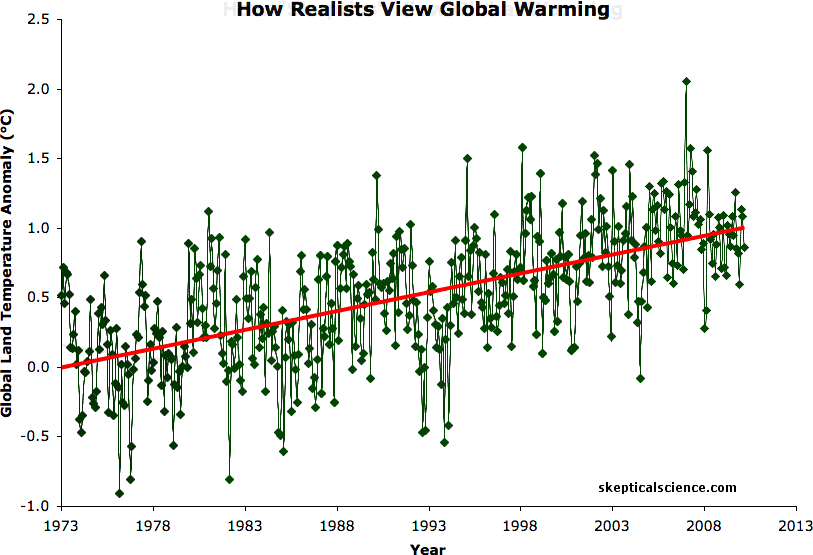
It certainly isn’t the IPCC’s fault that the “pause” notion took hold, then; rather, the blame falls upon a press that even now remains willing to channel climate skeptic claims. “I don’t in this particular instance blame the IPCC as much as I blame the media,” says Climate Progress‘ Joe Romm, a leading climate blogger who is generally quite critical of the IPCC’s communications efforts.
Yet the IPCC must shoulder some of the blame for what happened next—for it lent momentum to the “pause” story.
It appears that because of all the media attention, the panel felt pushed to address the alleged “pause.” Dennis Hartmann of the University of Washington, a coordinating lead author of the IPCC report, revealed as much to Climate Desk reporter Tim McDonnell in a recent interview, when he remarked, “Going into the IPCC this time, I would have said that, well, the trend over a 15-year record is not really very meaningful, because of the natural interannual variability of the climate system. But as the IPCC evolved, it became more and more of a public issue, so we felt we had to say something about it, even though from an observational perspective, it’s not a very reliable measure of long-term warming.”
Does this mean that the IPCC was baited, by skeptics and the media, into addressing a nonissue? Asked for clarification, Hartmann followed up by explaining that “I think to be thorough we needed to say something about the past 15 years in [the report], since the apparent reduction in the observed warming rate is so interesting and has received so much comment. It’s interesting on purely scientific grounds, but it does not have a huge impact on the scientific assessment and does not alter the basic facts.”
But why was there “so much comment” in the press? In significant part because of the interest of climate skeptics, who have long sought to portray climate research as uncertain and to gin up a debate. Indeed, this is not the first time that the IPCC has been accused of bending over backward to respond to skeptics. Climate researcher Michael Mann, for instance, has charged that the IPCC tends to err “on the side of understating the degree of likely changes,” in part because skeptics influence it from the outside.
The real problem, though, came in how the IPCC addressed the “pause” issue. In a leaked draft of the IPCC’s “Summary for Policymakers” that emerged into the press in August of this year, the so-called “pause” was described in statements that seemed almost ideally crafted for quote mining. If the “pause” was just the result of statistical selectivity rather than a robust trend, why wasn’t the IPCC saying so? Instead, the scientists’ own words seemed to suggest that there really was a global warming slowdown, and that the scientific community didn’t really understand it. To wit:
Global mean surface temperature trends exhibit substantial decadal variability, despite the robust multi-decadal warming since 1901. The rate of warming over the past 15 years (1998-2012; 0.05 [-0.05 to + 0.15] ºC per decade) is smaller than the trend since 1951 (1951-2012; 0.12 [0.08 to 0.14] °C per decade.
And:
Models do not generally reproduce the observed reduction in surface warming trend over the last 10-15 years.
This language was available to journalists for over a month before the final document came out, and seems to have greatly shaped their thinking and coverage. Indeed, in what was apparently the first report on the leak, by Reuters, reporter Alister Doyle wrote, “The panel will try to explain why global temperatures, while still increasing, have risen more slowly since about 1998 even though greenhouse gas concentrations have hit repeated record highs in that time.” That’s mild compared with the Fox News coverage, headlined: “Leaked draft of climate report struggles with drop in warming.”
The “pause” narrative was continuing to build, now with the IPCC itself helping to drive the story.
Meanwhile, the IPCC was self-hobbled in dealing with the “pause,” particularly when it came to explaining the causes behind the slight slowdown in the rate of warming. The panel has an odd rule that restricts which scientific papers it can talk about: There is a cutoff date (this time around, March 15, 2013) after which new research can no longer be cited. In this case, that includes papers explaining the somewhat slower rate of warming of late, including a study by Kevin Trenberth and colleagues at the National Center for Atmospheric Research, showing that the explanation for the “pause” was that more heat was going into the deep oceans. In other words, global warming continues apace; it’s just more pronounced at the moment in some parts of the climate system than others. “The IPCC report did not include any literature after March 15: including our paper on deep ocean heat,” Trenberth comments. “It deals only with published literature. So the hiatus is not on their horizon. It is a major failing.”
Finally, the actual IPCC “Summary for Policymakers” hit on September 27 (a Friday). And to a significant extent, the final report dialed back the troublesome language from the leaked draft. Hartmann again: “We added some explicit examples of what the uncertainty bars mean, and stated the statistical uncertainty in taking a short record from the global mean surface temperature record. This was suggested by the delegates and approved by them as a way of making it more explicitly clear how uncertain the trend estimates are for a 15 year time series with large year-to-year variability.” In the actual report, what that meant (among other things) is the first quotation above was replaced with the following:
In addition to robust multi-decadal warming, global mean surface temperature exhibits substantial decadal and interannual variability. Due to natural variability, trends based on short records are very sensitive to the beginning and end dates and do not in general reflect long-term climate trends. As one example, the rate of warming over the past 15 years (1998–2012; 0.05 [–0.05 to +0.15] °C per decade), which begins with a strong El Niño, is smaller than the rate calculated since 1951 (1951–2012; 0.12 [0.08 to 0.14] °C per decade).
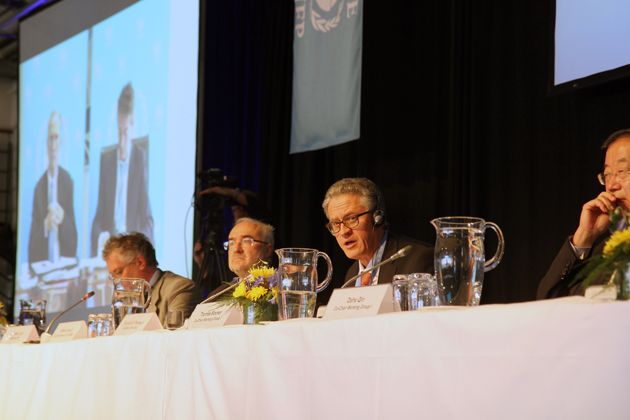
This is much harder to misread, misinterpret, or blow out of proportion. But by then, it was too late. At the press conference in Stockholm when the report was released, journalists relentlessly questioned the report’s drafters about the pause. Among the ensuing headlines? “Global Warming Slowdown Seen as Emissions Rise to Record.” “Climate change report’s ‘temperature hiatus’ fuels skeptics.” “Global Warming Has Slowed in Last 15 Years Despite Record Greenhouse Gas Levels, Scientists Say.” Heck, even Nature magazine, about as science-friendly a publication as you can find, let the “pause” narrative shape its headline: “IPCC: Despite hiatus, climate change here to stay.”
Fallout
It remains to be seen just how much damage has been done. But at minimum, we can say that during a major moment for climate scientists to communicate the direness of our plight, they were instead being questioned about why global warming has “paused.” Skeptics must be in heaven.
Whose fault is all this? The skeptics, the journalists—but yes, the scientists too.
“I think the deniers deserve most of the blame. They’re still trying to confuse people,” says Susan Joy Hassol, who directs Climate Communication, a nonprofit science and outreach group. “And I think the media’s to blame too, because they’ve allowed themselves to be distracted and misled. But the scientists have to take some responsibility when they write or say things that can be misunderstood, because it’s part of their job to communicate what they know in a way that the public can understand.”
There is a growing discussion of reforms to the IPCC, as mega-assessments of the sort that it produces are are hugely time-consuming to scientists. But this ought to be accompanied by another critique: The IPCC’s communication record is also pretty poor. It isn’t the IPCC’s fault that skeptics, abetted by some journalists, seized on the misleading “pause” story. But surely, this time around, it should have been ready for them.
Additional reporting by Tim McDonnell.
 “Have the Media Failed Us on Climate Change?” Climate Desk will be hosting a
“Have the Media Failed Us on Climate Change?” Climate Desk will be hosting a 